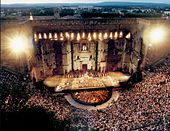Lucerne Festival
The Lucerne Festival is one of the most renowned international music festivals in the field of classical music and brings international artists and famous symphony orchestras from all over the world to Lucerne every year . Lucerne Festival was founded in 1938 by Ernest Ansermet and Walter Schulthess , and Michael Haefliger has been artistic director since 1999.
history
In the summer of 1938, a major concert was held for the first time in the Lucerne Tribschen , Richard Wagner's former residence , under the direction of Arturo Toscanini . From the beginning, the concerts of this festival were very well received, especially by radio stations from all over the world. The Swiss Festival Orchestra , an association of the best Swiss orchestral musicians, was founded in the 1940s and became a central element of the Lucerne International Music Festival IMF, as the festival has been called since 1943. In the decades that followed, the IMF were among the world's leading festivals for classical music. The most important orchestras, conductors and soloists each made guest appearances in the city of Lucerne for several weeks and gave concerts at various locations.
Since 1970 the event has been supported by a foundation ("Stiftung Internationale Musikfestwochen"). Since the 1970s, the annual festivals have had different mottos and guiding principles. Numerous parallel events such as the musica.nova series emerged. With the construction of the Lucerne KKL Culture and Congress Center at the end of the 1990s, the festival was given a new backdrop with one of the best concert halls in the world. In 2000, the IMF was renamed the Lucerne Festival .
The Lucerne Festival is a member organization of the European Festivals Association .
In 2020 the summer festival was canceled due to the COVID-19 pandemic .
Organizational form
The Lucerne Festival Orchestra was founded in 2003 by Claudio Abbado and Michael Haefliger and gathers internationally renowned orchestral musicians in Lucerne for two weeks every summer. Riccardo Chailly has been the orchestra's chief conductor since 2016 . In addition to maintaining the traditional repertoire, the programming and communication of contemporary music plays an important role at the Lucerne Festival. The promotion of young talent is just as important in the areas of Lucerne Festival Young and in the Lucerne Festival Academy. The academy was founded in 2004 by Pierre Boulez and Michael Haefliger. Wolfgang Rihm has been Artistic Director since 2016 , and Matthias Pintscher was at his side as Principal Conductor from 2016 to 2018 . Former participants of the academy are present as Lucerne Festival Alumni in Lucerne and worldwide with concert projects.
Lucerne Festival held three festivals every year until 2019. From 2020 the focus will be on the summer festival. This brings famous orchestras and artists to the fore, as well as the festival's own projects such as the Lucerne Festival Orchestra, the Lucerne Festival Academy and the Lucerne Festival Alumni. Each autumn and spring, a program weekend is to be added to replace the Easter and Piano Festival that took place until 2019.
- Summer Festival (from mid-August to mid-September, since 1938): Over 100 events are held annually as part of this main festival. Around 30 symphony concerts with the world's best orchestras and conductors form the core of the event. Since 1999 the summer festival has had a specific theme. There is a wide range of concert formats on offer - symphony concerts, chamber music, recitals, debuts, late nights and much more. "Composers-in-residence", "artistes étoiles" and innovative concert formats such as 40min and Young set important programmatic accents. The 2020 Summer Festival had to be canceled due to the corona pandemic.
- Easter Festival (from 1988 to 2019, 9 days before Easter): The festival at Easter time mainly focused on sacred music . The concerts took place both in the churches of the city of Lucerne and in the KKL Lucerne.
- Piano Festival (from 1998 to 2019, 9 days in November): The autumn festival was devoted exclusively to keyboard instruments. Besides the classical piano music while also standing jazz in the foreground and there were also piano O ff-stage events Select in the bars of the city of Lucerne instead.
literature
- Fritz Schaub : International Music Festival Lucerne, 1938–1963 / Semaines Internationales de Musique de Lucerne, 1938–1963 / Lucerne International Festival of Music, 1938–1963. Lucerne 1963.
- Erich Singer : Lucerne Festival, From Toscanini to Abbado, Pro Libro Luzern . Lucerne 2004
Web links
Individual evidence
- ^ Antonio Baldassarre: Ernest Ansermet and Walter Schulhess. Historical Lexicon of Switzerland, accessed on May 5, 2020 .
- ↑ a b c d Lucerne Festival [1]
- ↑ Toscanini conducts the “Concert de Gala” ( memento of May 7, 2010 in the Internet Archive ) on August 25, 1938 in Tribschen-Park
- ↑ Lucerne Festival - Prehistory
- ↑ Lucerne Festival - History
- ↑ Susanne Kübler, Pascal Blum: Ban on major events: No Lucerne Festival, no Locarno film festival. In: landbote.ch. April 29, 2020, accessed April 29, 2020 .
- ↑ Lucerne Festival: Media release: Lucerne Festival relies on its own strengths. Lucerne Festival, May 7, 2019, accessed on May 16, 2019 .
Coordinates: 47 ° 2 '55.6 " N , 8 ° 18' 23.5" E ; CH1903: six hundred sixty-five thousand nine hundred and forty-seven / 211225

